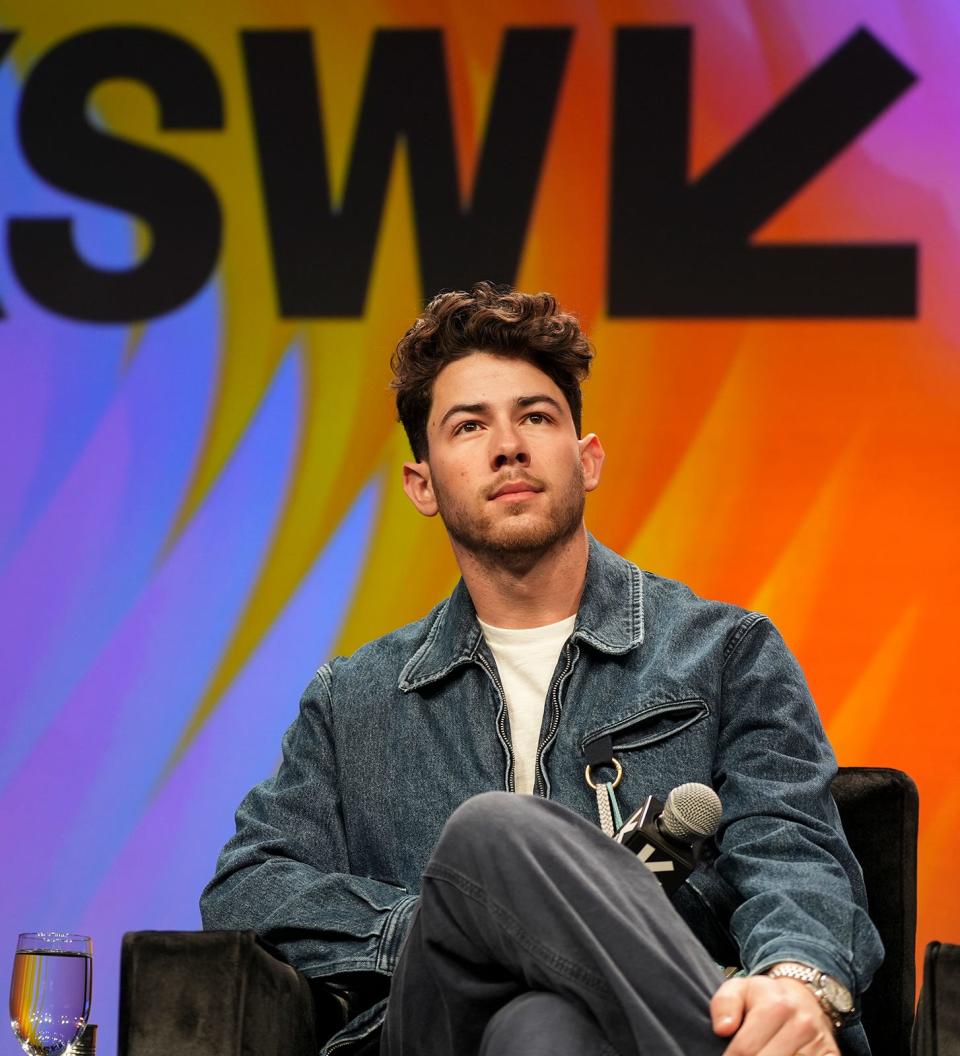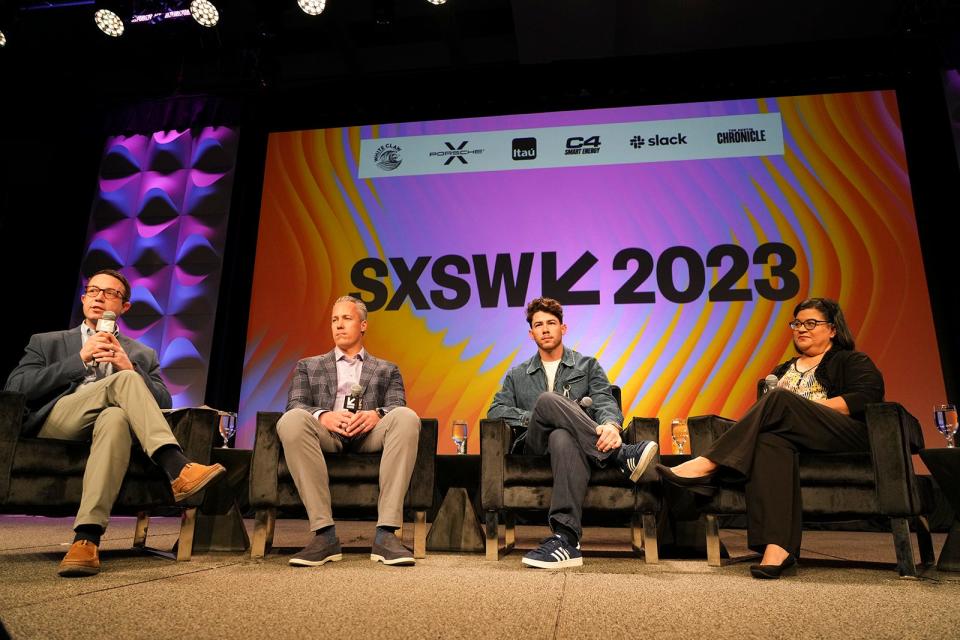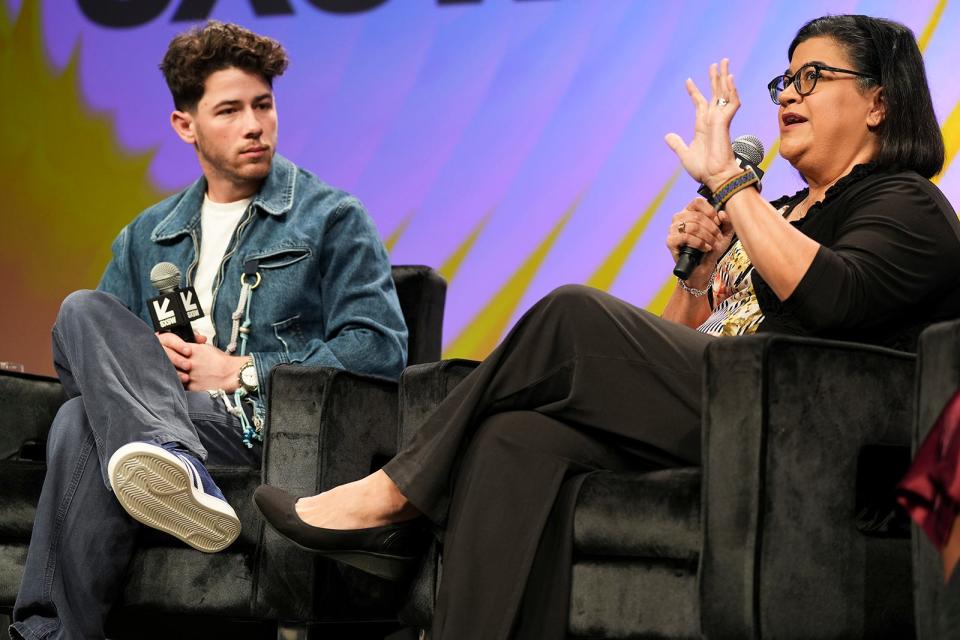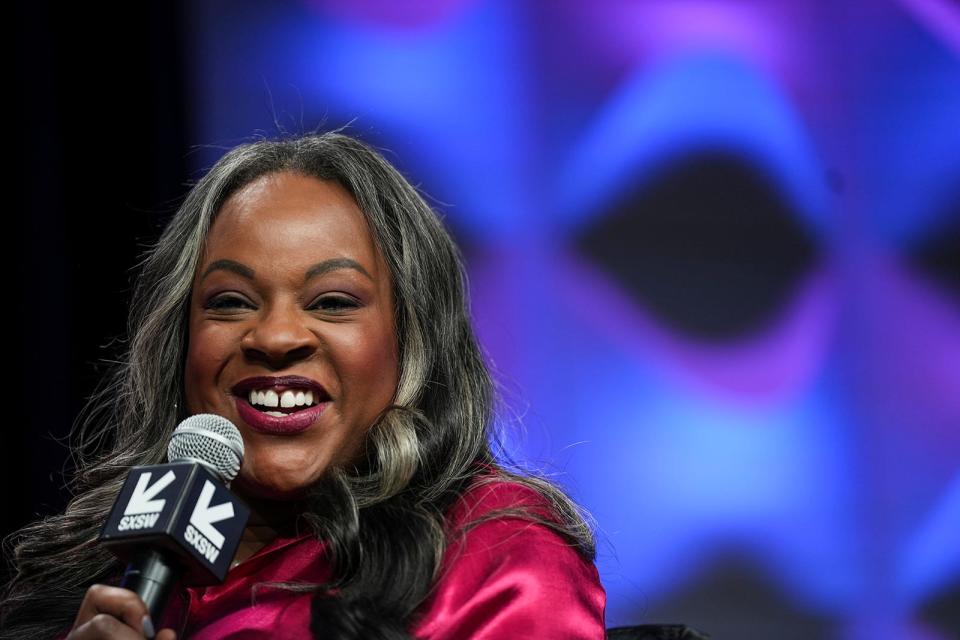Nick Jonas opened up about fatherhood, diabetes and more at SXSW. Here's what he told us after.
- Oops!Something went wrong.Please try again later.
- Oops!Something went wrong.Please try again later.
When Nick Jonas was introduced to the South by Southwest audience Monday morning, he was called a global superstar first and then a proud dad.
"I prefer proud dad over global superstar," Jonas said.
Jonas, one-third of the Jonas Brothers and a solo artist, came to SXSW to talk about diabetes and the technology that is helping make his life easier as a Type 1 diabetic.
His panel Monday morning was "Crushing: The Burden of Diabetes on Patients," with fellow diabetics, a doctor and the chief operating officer at Dexcom, which makes the continuous glucose monitor that Jonas wears to monitor his blood sugar. Jonas wears his on the back of his arm, and it sends readings to his phone. He recently starred in a Super Bowl commercial for the brand.
The monitors are often covered by some insurance. They are also available for $177 for three 10-day monitors online, and Dexcom has a program for $89 for that month's supply.
Jonas was diagnosed at age 13, just as his career with the Jonas Brothers was beginning to take off. Now 30, he is married to Priyanka Chopra Jonas, who gave a SXSW keynote talk Friday, and they have a 1-year-old daughter, Malti.
We were at his panel and talked to Jonas afterward about living with diabetes, fatherhood and heading back to Broadway this week, this time with his brothers.
What was it like when Nick Jonas was first diagnosed?
Before his diagnosis, he began to lose weight, he was urinating all the time, and he was really irritable, beyond what is normal for a 13-year-old, he said in an interview with the Statesman after the session.
"It was a really tough time," he said. "My glucose (or blood sugar reading) was over 800, and the target range is anywhere from 70 to 120. It was a long time living with that higher glucose level."

Why does he continue to talk about his diabetes?
Through Beyond Type 1, the nonprofit he co-founded, Jonas has been working to raise awareness and accessibility and to change the conversation around diabetes to be less clinical and more patient- and family-centered.
"I can be a part of a conversation and use the platform I have to raise awareness," he said. "It would be easier to live with the disease if I was open and honest, and hopefully for someone else who is in a similar position trying to figure out how to navigate a life with diabetes, me speaking about it could be helpful in whatever way. It's been a crazy ride, but I'm in good health now."
What advice would he give a 13-year-old newly diagnosed with diabetes?
"Puberty alone is a big hurdle for young people when you add diabetes into the mix or an autoimmune disease of any kind; it can be really tough," he said. "For me it was about trying to manage my lifestyle with touring and working as much as I was working that time. ... while trying to figure out how to manage that disease."
Dexcom monitors allow people to share their glucose numbers with family members. Jonas shared his with his parents and brothers, but they called him too much and he took them off the sharing. Now he shares his numbers with his wife.
How does mental health affect diabetes?
Jonas also talked about the importance of mental health and diabetes.
"Mental health is a very important conversation that affects every aspect of all of our lives," he said. "When you compound that with something like diabetes, there are naturally going to be things in overlap with that."
Once he started therapy, he saw "how much I could improve my life both mentally and physically."
"For young men, it's an important thing that can be overlooked."

How has the glucose monitor changed his life?
Before he had the monitor, Jonas said, it was a lot of trial and error with his blood sugar, food and medication.
"Once CGM (continuous glucose manager) came into my life and became a part of my management of my disease, things got a whole lot easier," he said. "I am incredibly grateful to have this technology and be in a spot where I'm getting readings so frequently. I think back to the times when I was pricking (my finger) 10 to 12 times a day."
Now, he said, "I'm getting so many numbers so frequently, I'm able to kind of predict when something happens ... and make those changes in real time," he said.
How does he manage his diabetes while on tour?
Being on tour is not that different from when he is at home, he said. "It's about staying as on top of it as I can. I don't like the way it feels when my blood sugar is high or low. I try to stay within range."
His glucose reader's alarm has gone off while he is on stage. It doesn't mean he mismanaged his disease. "There are things that are unpredictable about this disease," he said.
He keeps juice near him and will drink it if his sugar is too low.
"I try to stay as calm as possible," he said. "My team is also there side stage and is prepared for whatever scenario could happen."

What's the biggest misconception about diabetes?
People often make comments about the food he can and cannot eat.
"I've worked really hard to set the record straight on those kinds of things," he said.
All the panelists said that they can have cake if they want to and reminded the SXSW crowd not to ask people with diabetes what they can or can't eat.
The Rev. Mireya Martínez, a United Methodist Church minister who has had Type 2 diabetes for 20 years, since she was 23, talked about the misconception that diabetes is something she got by making poor choices. She has a family history of diabetes and family members who died of it.
Finally her therapist reminded her that her blood sugar readings were "just numbers," she said. Sometimes the shame that people, including doctors, put on those numbers, as if they are a value of a person, is not helpful, she said.
She wants to change the narrative. If her glucose monitor goes off, it's sometimes not anything she did.
"What affects diabetes? Everything," she said. That includes illness, medication, stress, food and exercise.
Jonas agreed. "The weight of decision-making diabetics have," he said. It's what to eat, how much to exercise, how much insulin to use.

What is the future of diabetes?
"There's been so many strides made to awareness even in the 17 years since I was diagnosed," Jonas said.
Smarter, easier monitors are on the way. Dexcom just introduced its seventh version, with changes based on user feedback.
"Technology continues to evolve," said Jake Leach, the chief operating officer of Dexcom.
"The biggest unmet need is a cure," Leach said. "We support a lot of research in the area. There's a lot we can do in the way of reducing the onset of autoimmune diseases."
The cost of care is evolving, Leach said. Dexcom has reduced the cost of the monitors 50% in the past five years.
Drug manufacturer Lilly announced last week a $35 price for insulin — instead of hundreds or thousands of dollars, depending on insurance.
Also on the panel was Colorado state Rep. Leslie Herod, who helped get the cost capped in Colorado, the first state to do so. Jonas planned to follow up with her about how to work together on legislation to improve costs and accessibility.
What is next for Nick Jonas?
Jonas is heading to Broadway on Tuesday for a weeklong run with the Jonas Brothers, performing an album each day, ending with the premiere of the new one.
"We have some surprises up our sleeves," he said.
He performed in the same theater he will be in this week when he was 8, in "Annie Get Your Gun" with Reba McIntire.
"It will be fun to go back 21, 22 years later with my brothers and share this very special thing with our fans," he said.
How has fatherhood changed him?
"My life has changed in so many ways ... it's incredible," he said. "The greatest gift. I feel so incredibly fortunate to have such a wonderful partner."
Managing his diabetes is important to being a father, a husband, a rock star, an advocate.
"I try to focus on staying as present as possible and taking whatever steps I can throughout the day to make sure I can be in the best health I can be," he said.
This article originally appeared on Austin American-Statesman: We talked to Nick Jonas about diabetes, fatherhood and more at SXSW

